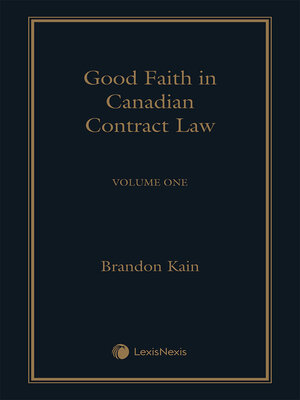
Sign up to save your library
With an OverDrive account, you can save your favorite libraries for at-a-glance information about availability. Find out more about OverDrive accounts.
Find this title in Libby, the library reading app by OverDrive.



Search for a digital library with this title
Title found at these libraries:
| Library Name | Distance |
|---|---|
| Loading... |
Good faith is a critical feature of contracts and commercial disputes, where its influence upon the parties' rights and obligations can be profound, and often outcome-determinative. However, despite its centrality to legal systems around the world, good faith is still at an early stage of development in Canada's common law jurisdictions, and many difficult questions about it remain. Decisions regarding contractual good faith are released on a daily basis by the courts, and it is difficult to keep track of the growing body of case law.
Good Faith in Canadian Contract Law is the first and only text in Canada to undertake a systematic review of the organizing principle of good faith and its associated doctrines. It analyzes jurisprudence, commentary and legislation from a number of jurisdictions, and provides readers with a full picture of how good faith operates throughout the life of a contract.
The book is written by Brandon Kain, who successfully acted as counsel to the appellants in the Supreme Court of Canada's leading good faith cases of Bhasin v. Hrynew and C.M. Callow Inc. v. Zollinger, and has served as an adjunct law professor for over a decade.
Topics Covered
Who Should Read This Book







